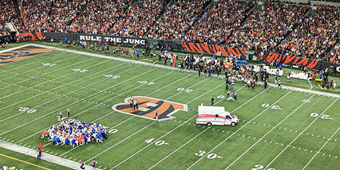The Party Crasher: Holiday Heart Syndrome

Find Your Perfect Match
Answer a few questions and we'll provide you with a list of primary care providers that best fit your needs.
Celebrating the holidays with family and friends does your heart good. Overeating and drinking too much alcohol while you party, though, can interrupt your good cheer with a condition called “holiday heart syndrome.”
This condition is characterized by a fluttering in the chest, an irregular heart rhythm that can be experienced by people with no previous heart disease symptoms.
Is it cause for alarm? Premier Health Now asked Mukul Chandra, MD, of Premier Cardiovascular Institute.
Dr. Chandra says, “Alcohol is a toxin to the body and can cause you to lose a lot of potassium. This causes a disturbance in the heart rhythm and can send the heart racing at a hundred beats per minute.” Salty foods, excess caffeine, stress and overeating may contribute.
A popular Christmas gift – fitness trackers – often lead people to discover they may be experiencing holiday heart syndrome, when they see their heart rate rise, Dr. Chandra said.
Treating Holiday Heart Syndrome
Irregular rhythm associated with holiday heart syndrome usually corrects itself. But people with heart disease risk factors such as high blood pressure are at greater risk of a type of irregular heart rhythm, atrial fibrillation – even with less alcohol. This can lead to stroke, heart failure or heart attack. Other symptoms of atrial fibrillation may include shortness of breath, fatigue, dizziness and chest pain.
If you have these symptoms, call 911, Dr. Chandra advises. If your symptoms are milder, you may have a friend drive you to the nearest emergency room. There you’ll be observed until your heart rhythm returns to normal.
If it doesn’t, your doctor will prescribe medication and, in some cases, an electrical shock to return your heart to normal rhythm.
How to Prevent Holiday Heart Syndrome
- Drink in moderation
- Eat to replace potassium and other electrolytes lost through urination. Drink water. Dehydration can throw off the balance of electrolytes.
- Limit your intake of salty and sugary foods, which can raise your blood pressure.
- Control stress, which can increase your heart rate and blood pressure.
If you have any questions about your heart health, be sure to talk with your doctor or health care provider.
Find Your Perfect Match
Answer a few questions and we'll provide you with a list of primary care providers that best fit your needs.
Source: Mukul Chandra, MD, Premier Cardiovascular Institute; CBC Radio-Canada




